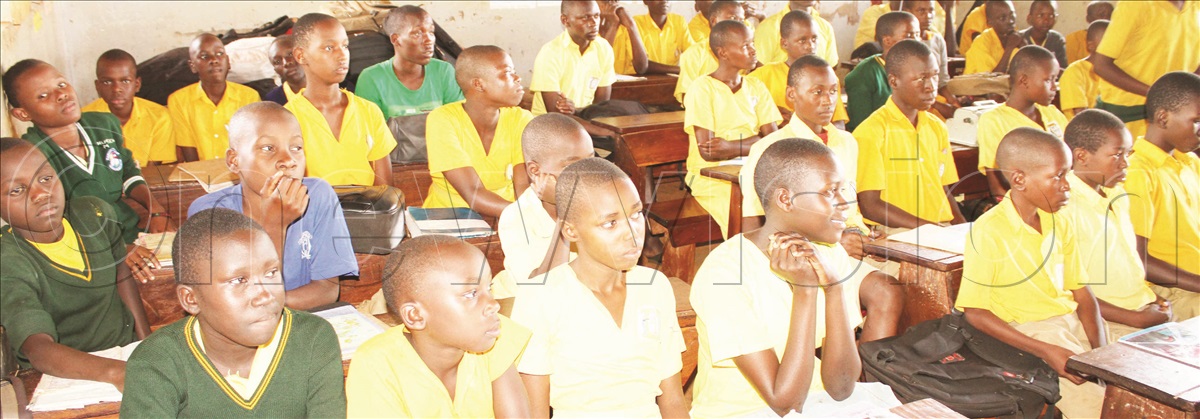This article was first published in the New Vision on May 19, 2021
By Conan Busingye
The Government is considering implementing continuous assessment of learners in primary schools, as it is with the secondary level. Secondary schools, starting with Senior One, started using continuous assessment early last year.
Continuous assessment is a form of educational examination that evaluates pupils’ progress throughout a prescribed course. It is often used as an alternative to the final examination system. Proponents of continuous assessment argue that the approach allows tracking progress and offers students more support, guidance and opportunities to improve during the course or programme.
In the current education system, a pupil sits four examinations papers, each in about two-and-a-half hours and is tasked with recalling what was taught in the last seven years. Their score in these exams determines whether a child proceeds to the next level or not.

Under continuous assessment, part of the 100% total score will be determined by daily or weekly performance in class, on various activities and not only the final examination. The current system of assessment focus only on a child’s ability to recall or cram and not necessarily what they can do practically.
This idea has been in the pipeline for almost two decades. Education experts say the examinations, where students sit only four papers, should be improved by using some of the scores from continuous assessment tests to promote students to the next class.
This was revealed by First Lady and education minister Mrs Janet Museveni, last week, while presenting the sector’s Manifesto performance report for 2016-2021; at State House, Entebbe.
Mrs Museveni says, “as a country, we need to change assessment of learners. Other countries have already embraced continuous assessment and will need to take lessons from them as we improve our country’s education.”
In the presentation of the report, the education sector is rated by the Manifesto Implementation Unit to have achieved 80% in the last five years of the National Resistance Movement government, which was also re-elected.
Mrs Museveni also admitted that the sector has not started continuous assessment in primary schools in the last five years as had been anticipated due to limited financial resources.
She noted that in one of the commitments that the Government had made to the people of Uganda, as a way of improving the quality of education, “was the introduction of a continuous assessment examination system at primary education level and integrating the results in the final marks.
Mrs Museveni said, “the assessment method is informed by what is prepared in the curriculum; and to have a change of assessment, the curriculum needs to be reviewed. As such, continuous assessment has not been introduced in the primary education sub-sector yet.”
“During this term under review, the ministry focused its resources on completing the development and rollout of the revised lower secondary curriculum. But, we hope that the Government will embark on this new proposed assessment of the pupils when the curriculum is being revised,” she added.
Deeper Reality
The Government is finalising preparations, to start reviewing the primary school curriculum, which will also involve starting continuous assessment of learners. This allows the testing of other abilities and skills of the pupils, other than recalling what they were taught.
Curriculum experts explain that an advantage of formative assessment for learning is that it is ongoing. This allows for incremental feedback to identify problems at their earliest stages. For example, a student can correct conceptual errors before undertaking work on a term paper.
National Curriculum Development Centre executive director Grace Baguma says as a student works on a topic, input from the teacher can inform, guide and validate each step of the process. The other argument is that cheating and plagiarism remain significant problems in academic settings, but when you use the formative assessments, this reduces the temptation to cheat. This allows students to focus on learning instead of grades.
Other reports and studies concur with this argument. In its 13th edition 2019 report, The World Bank proposing Economic Update on Human capital in Uganda, advises, “Uganda, amongst other things, should abolish the Primary Leaving Examinations.”
The World Bank argues that the move will significantly improve the transition rates to lower secondary, which is low, implying massive wastage of resources by training pupils who never make it to secondary.
Why Change Exams
The education ministry reports show that of the over 1.7 million pupils who join Primary One, only about 30% of them always make it to Primary Seven. Even after doing national examinations, almost half of them fail to enter secondary education.
From primary to secondary education in Uganda, the transition rate had declined from 72% in 2013 to 61% in 2017.
The World Bank, says Uganda will need to improve its lower secondary education enrolment from 32% to 47% by 2025.
The body’s main argument is that PLE, just like in some developing countries, pupils’ assessments is a significant limiting factor in the transition of pupils due to the assessment system, which deters students from passing just because they cannot recall, in a few hours, what was taught in the last seven years.
The World Bank questions the validity and quality of exams done, which have no continuous assessment, as a basis for determining transition to secondary schools or other levels of education.
Teachers also argue that using this assessment system if well-funded by the Government, pupils can progress through material at their own pace and remain engaged by pursuing more challenging work as they master the basics, in their learning process.
Reality
Uganda lags behind its East African neighbours in terms of improving enrolment at the lower secondary level.
Baguma says the NCDC is conceptualising a new curriculum, focusing on formative assessments for Uganda’s learners.
It is a policy eminent Ugandan education experts like Prof. William Senteza made a case for.
The World Bank says Uganda will need to enforce regular school inspections to guide the new teaching and learning practices if the continuous assessment is implemented.
In previous interviews, Christopher Muganga, the then assistant commissioner in charge of reforms at NCDC, said continuous assessment would by now be part and parcel of the curriculum if schools had not misconstrued it.
“Instead of using it to check learners’ progress, over some time, schools used it to check learner’s class attendance, to entice parents to pay money early enough and to gauge whether their learners would get good or bad grades in the national exams. The lack of a detailed implementation plan exacerbated the problem, but the new lower secondary curriculum provides a new lease of life – with continuous assessment embedded in,” Muganga says.

Teachers Welcome The Idea
Mugwanya Preparatory School headteacher Bro. Godfrey Lutaaya argues that the Primary Leaving Examination (PLE) needs to be scrapped like it’s done in other developed countries such as Ireland.
Bro. Lutaaya, who is one of the 2018 Teachers Making a Difference winners, said when he went to Ireland on a study tour under the Teachers Making a Difference Award, he observed: “We are messing up the career paths of our children by subjecting them to PLE. Developed countries already know the truth, and countries such as Ireland don’t have these restrictive national examinations at the end of the primary schooling cycle.”
However, this has remained a contentious debate; much as the education ministry is aware and appreciate the goodness of continuous assessment. It has in the past been piloted in primary schools, revamped under Early Grade Reading and Assessment, which was kicked off on a pilot in 2014 and now intertwined the new lower secondary curriculum.
Founding executive director of Uwezo Uganda Mary Goretti Nakabugo, who works for an organisation which tracks academic performance in the region, says: “Continuous assessment is one of the best ways to improve the country’s education system.”
We hope that this will be embraced soon by the Government of Uganda,” she adds.
Dr Muyingo Responds
Dr John Chrysostom Muyingo, an educationist and state minister of education, says: “Indeed, continuous assessment is great since it helps parents and teachers see early indications of the students’ performance. This helps a teacher determine how best to handle such a pupil, before even reaching Primary Seven or Senior Four.”
He adds that continuous assessment increases the sense of inclusiveness of students’ abilities and that success is not a reward for only those who can recall what was taught, in a few hours.
“Continuous assessment sends the message to learners and teachers that everyone can succeed if given enough time and practice. This reduces the anxiety around testing and heightens the emphasis on the learning itself,” Muyingo says.









Leave feedback about this